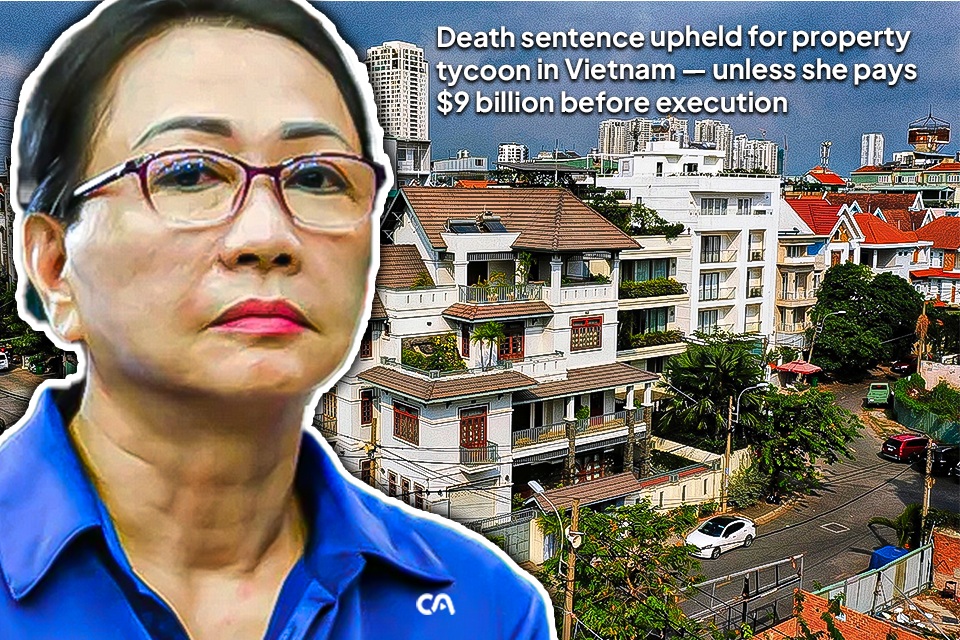
Vietnam's Supreme Court Upholds Death Sentence for Property Tycoon.
Uchenna S
12 Dec, 2024 08:00 pm
Vietnamese Court Upholds Death Penalty for Property Tycoon in $27 Billion Fraud Case with Potential for Sentence Reduction
A Vietnamese court has upheld the death penalty for property tycoon Truong My Lan in a high-profile multibillion-dollar fraud case, though there remains a slim chance for her life to be spared if she repays three-quarters of the stolen assets.
Lan, 68, was convicted earlier this year for swindling $27 billion from Saigon Commercial Bank (SCB), which prosecutors said she effectively controlled. She appealed her death sentence during a month-long trial, but on Tuesday, the Ho Chi Minh City court ruled there was “no basis” to lower her sentence.
A Slim Hope for Sentence Reduction
While the death penalty remains, the court left the door open for a reprieve. If Lan returns three-quarters of the stolen funds—around $9 billion—her sentence could potentially be reduced to life imprisonment. Lan's lawyers told the BBC that her assets, including real estate holdings, could satisfy the amount but would take time to liquidate.
Nguyen Huy Thiep, Lan's lawyer, emphasized the challenge of selling her assets quickly but remains hopeful that the court could provide favorable conditions to expedite repayment.
“This would give Truong My Lan a chance to continue making compensation,” Thiep told the BBC.
Lan's appeal is not her last option; she can still petition the Vietnamese president for amnesty, although execution by lethal injection remains a possibility.
A Family Connection & Economic Fallout
Lan's husband, Eric Chu Nap Kee—a Hong Kong billionaire—had his own sentence reduced from nine years to seven as part of the case.
The fraud scandal has devastated tens of thousands of investors in SCB, sparking rare protests in Vietnam as victims demand their money back. SCB was heavily impacted, with the embezzlement estimated at six percent of the country's 2023 GDP.
Lan’s company, Van Thinh Phat Group, owns high-profile assets like shopping malls, luxury housing complexes, and a harbour in Ho Chi Minh City, all linked to the embezzlement scandal.
Lan’s Attempt to Rebuild Trust
During her initial trial, Lan was found guilty of embezzling $12.5 billion, with prosecutors estimating the full scale of financial damage to the Vietnamese economy at $27 billion. Lan has since taken steps to return assets, including turning over more than 600 family-owned properties to the court—though the full financial value remains unclear.
During her trial and recent appeal, Lan has fluctuated between defiance and contrition. In recent hearings, she expressed remorse, saying she felt "very embarrassed to be charged with this crime" and "pained due to the waste of national resources."
Lan argued that she had already repaid the amount required to reduce her sentence, though this has not swayed the court’s stance.
Corruption Crackdown & Broader Impacts
Lan’s case is part of a sweeping national anti-corruption drive dubbed the “burning furnace” by Vietnamese authorities. As part of this investigation, dozens of high-ranking officials and business figures—including central bank officials—have been arrested.
In April, a former chief inspector from the State Bank was sentenced to life in prison for accepting a $5 million bribe to overlook SCB's financial problems. The investigation continues to send shockwaves through the nation's financial system.
The scale of this fraud, and the investigation surrounding it, underscores both systemic corruption and economic instability.
Looking Ahead: A Long Road for Justice
Although the court has upheld Truong My Lan’s death sentence, her lawyers believe that execution could take years to implement. As they continue efforts to liquidate assets and repay stolen funds, the case remains far from resolution.
The financial fallout from this scandal and Vietnam’s ongoing battle with corruption highlight how deeply connected politics, business, and law enforcement have become in the fight for accountability and economic stability.




0 Comments